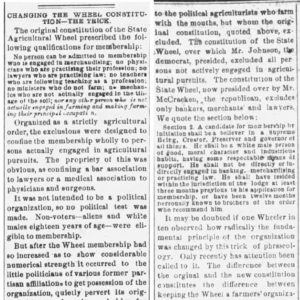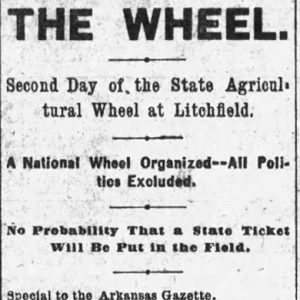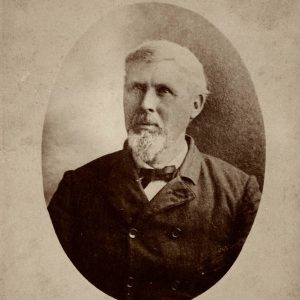calsfoundation@cals.org
Isaac McCracken (1846–1911)
Isaac McCracken played a prominent role in the farmers’ and labor movements in Arkansas (and, to a lesser degree, nationally) during the late nineteenth century. McCracken was also active in Arkansas politics as an independent and third-party leader during that era. He served in the Arkansas General Assembly in the 1880s and ran for Congress at a time when elections in Arkansas were notoriously violent and fraudulent.
Isaac McCracken was born in 1846 in Huntingdon, Quebec, Canada, but he spent most of his childhood in Lowell, Massachusetts, where his family settled when he was eight years old. In 1867, he married Delia Maral Allen in Wisconsin, and the couple moved to Arkansas three years later. They had nine children between 1872 and 1890. Upon moving to Arkansas, McCracken worked as a machinist in the Iron Mountain Railroad shops in North Little Rock (Pulaski County), where he became an active member of the blacksmiths’ and machinists’ union. In 1872, McCracken and his wife moved to a farm in Ozone (Johnson County), where they would reside for the rest of their lives.
In 1882, McCracken and Marion Farris formed the Brothers of Freedom (BOF), an organization that would consist primarily of small landowning farmers who were struggling to maintain that status in an era when farmers were beset by falling crop prices and rising business costs. The BOF initially focused upon diversified farming and cooperative enterprises as means of helping its members, but the organization soon entered the political arena. In 1884, McCracken, who was then the organization’s president, ran for and won election to the state legislature as an independent candidate. In October 1885, the BOF merged with the Agricultural Wheel, a similar farmers’ organization which also had been formed in Arkansas in 1882. As a result of the merger, the name of the Agricultural Wheel was kept and that of the BOF was discarded, but McCracken became the state president of the organization. By 1886, the Agricultural Wheel had expanded into other states, and on July 28 of that year, delegates from Arkansas, Kentucky, Missouri, Tennessee, and Texas met at Litchfield (Jackson County) and formed what they ambitiously termed the National Agricultural Wheel, with McCracken as president. McCracken played a significant role in the previously non-partisan Arkansas State Wheel’s nomination of a ticket in the state elections that year, although he did not run for statewide office himself.
In 1888, McCracken and other leaders of the Arkansas State Wheel helped form the Arkansas Union Labor Party (ULP), one year after the formation of the ULP as a national organization. Many leaders of the Knights of Labor in Arkansas also participated in building this party, and McCracken himself became a member of the Knights at some point during this period. After presiding as chairman of the first state ULP convention in Little Rock (Pulaski County), in April 1888, McCracken ran for a seat in the U.S. House of Representatives that fall. In an election season in which Arkansas Democrats resorted to fraud, intimidation, and even murder to hold on to power (as was most infamously shown by the assassination of Wheel-supported Republican congressional candidate John M. Clayton in Conway County), McCracken received forty-two percent of the official vote count in the Fourth District as the lone challenger to Democratic incumbent John H. Rogers. In Pulaski County, a Knights of Labor stronghold at the time, McCracken won sixty percent of the official tally.
Although McCracken would never again run for such a high office, he continued to be an important figure in the Arkansas ULP as well as in the farmers’ and labor movements. After the National Agricultural Wheel merged with (and, in name, was absorbed by) the Southern Farmers’ Alliance in 1889, McCracken became the vice president of the latter organization. In June of that year, he contacted the national head of the Knights of Labor, Terence V. Powderly, urging unity between the farmers’ and labor organizations and inviting the Knights to send delegates to a Farmers’ Alliance conference to be held in St. Louis, Missouri, in December of that year. This in turn helped lay the groundwork for the formation of the People’s (or Populist) Party in the early 1890s. McCracken remained active in the People’s Party and the Knights of Labor in the 1890s, but neither of these organizations remained alive in any significant way by the dawn of the twentieth century.
McCracken died in 1911; he and his wife are buried in the Russell Cemetery in Ozone.
For additional information:
Henningson, Berton E., Jr. “Northwest Arkansas and the Brothers of Freedom: The Roots of a Farmer Movement.” Arkansas Historical Quarterly 34 (Winter 1975): 304–324.
———. “Root Hog or Die: The Brothers of Freedom and the 1884 Arkansas Election.” Arkansas Historical Quarterly 45 (Autumn 1986): 197–216.
Hild, Matthew. Greenbackers, Knights of Labor, and Populists: Farmer-Labor Insurgency in the Late-Nineteenth-Century South. Athens: University of Georgia Press, 2007.
———. “Labor, Third-Party Politics, and New South Democracy in Arkansas, 1884–1896.” Arkansas Historical Quarterly 63 (Spring 2004): 24–43.
McMath, Robert C., Jr. American Populism: A Social History, 1877–1898. New York: Hill and Wang, 1993.
Paisley, Clifton. “The Political Wheelers and Arkansas’ Election of 1888.” Arkansas Historical Quarterly 25 (Spring 1966): 3–21.
Wheeler, John M. “The People’s Party in Arkansas, 1891–1896.” PhD diss., Tulane University, 1975.
Matthew Hild
Georgia Institute of Technology
 Post-Reconstruction through the Gilded Age, 1875 through 1900
Post-Reconstruction through the Gilded Age, 1875 through 1900 Agricultural Wheel Article
Agricultural Wheel Article  McCracken Article
McCracken Article  Isaac McCracken
Isaac McCracken 



Comments
No comments on this entry yet.